Episode 1: Tithes and Invitations
Stensia sleeps soundly. The sleep of the undisturbed, the sleep of the carefree, the sleep of those utterly without worry—so sleep the vampires within their spires. They have no real need of sleep, but the peasants have need of it, and that makes it an almost novel thing. Wouldn't it be delightful if—now, at the height of our power—we slept?
It does not last long. An hour or two, perhaps. A nap. A joke, a gesture, a passing fascination.
But it is the best hour the humans of Stensia have had in weeks. With the moon high in the sky, though their bodies may long for a moment's respite, there isn't any to be found.
For when the vampires wake from their little jest, they will doubtless hunger, and when they hunger, they hunt, and when they hunt, people die.
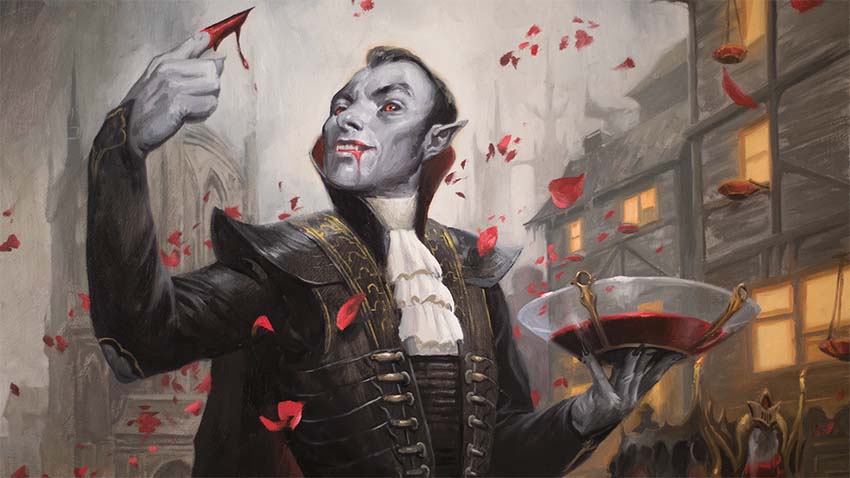
Grigori presses the knife to his mother's wrist. She does not move, she does not stir, for she too is asleep—and has been for some time. Two nights (it is difficult now to keep track) after the Harvesttide Massacre, his mother simply
"Innistrad will endure," she had said to him. Another prayer the angels did not deign to hear.
And he sees her now, weeks later, still asleep. Sallow skinned and thin framed. Chest rising and falling. His mother.
Her blood drips into a small glass bowl. It is likely worth more than anything he has ever touched in his life—perhaps worth more than everything he's ever touched together—but it is not his.
The decree hanging outside his door was very clear on that part.
Blessings and good tidings upon the reader, for the day of most splendid joy approaches.
We eagerly await your tithes: one bowl of blood from each resident, once a night until the festivities. We have even been so generous as to provide you the bowls. Mind that they are enchanted; we shall know if you, ungrateful beast that you are, shatter them. Our representatives will be by to collect. Do not make the mistake of offending them. You know, I should think, the consequences of such foolish actions.
We hope that this found you well. If it did not, know that your blood will serve no matter your condition. You are not exempt.
Your eternal liege,
Olivia Voldaren, Unquestioned Lord of Innistrad
He watches his mother's blood drip into the bowl and wonders, idly, what she would have made of such a proclamation. If she would have burned it, like he considered burning it. If they would have fled together for any other place than this.
Stensia.
Once, he loved this place: its spires, its secular air, its traditions. Everywhere on Innistrad, there were traditions, of course, but only in Stensia did it feel like they had proper application. In Kessig, they only suspected they were surrounded by werewolves. Here, the presence of vampires was as natural as the presence of the plague.
But how could you manage a plague that had so changed?
Some of the villagers had taken up jobs in the castles nearby. If you worked for them, they said, you were safe.
But sometimes you die out there in the castles, while you're on the job, and what's your family to do then?
And now, the tithes. The people here used to think they were safe—but even those who risked work in the palaces of the damned had to provide their blood.
Nothing felt right anymore.
Grigori picks up the bowl of his mother's blood. He kisses her forehead. With a fingertip, he wipes the rim so that none spills on the ground as he carries it outside. Everywhere his eyes fall, there is death and there is emptiness. Weeks ago, his friends lit candles and sang songs outside their homes. Weeks ago, effigies burned in every window. Weeks ago, he could not take a step outside without seeing half a dozen of his friends grinning, arm in drunken arm, as they danced on the roads too frightening to walk.
But the streets were empty now. Too busy working, most of them—and those who didn't often died. It hadn't happened all at once, like the massacre, but it had happened all the same. These days, the only people he saw on the roads were not people at all.
Those who could leave had left, though where he could not say. Things had gotten worse in Stensia, certainly, but they'd gotten worse everywhere else, too. From the scarce news he'd gathered, nowhere was safe anymore. In this everlasting night, they never have to rest. Where could you go to hide from the moon?
The lifegiving silver light of the moon is now only another kind of pallor upon the Plane.
Grigori sets the bowl down next to its twin, the one he filled an hour ago. Weary—from loss of blood and loss of hope—he sits on his haunches and stares up at the moon.
Black bats streak across the silver, a swarm thick as crows on a corpse. And, like crows, they've found something to carry: ornate black envelopes, slashed with white and red. He sees them as they soar past.
Some break off from the others. Two head straight for him, each stopping before the bowls. They pick them up in their little mouths, his blood and his mother's, and for an instant, Grigori considers killing them. It would surely be an easy thing to snap their necks.
But within the day (could he even call them days?), they would come for him, and for his mother, and nothing at all would change except that the two of them would be dead.
Innistrad would continue on, dying and undying.
The bats take off.
Grigori watches them go.
He heads back in to take care of his mother.
He can only hope she, too, is sleeping soundly.
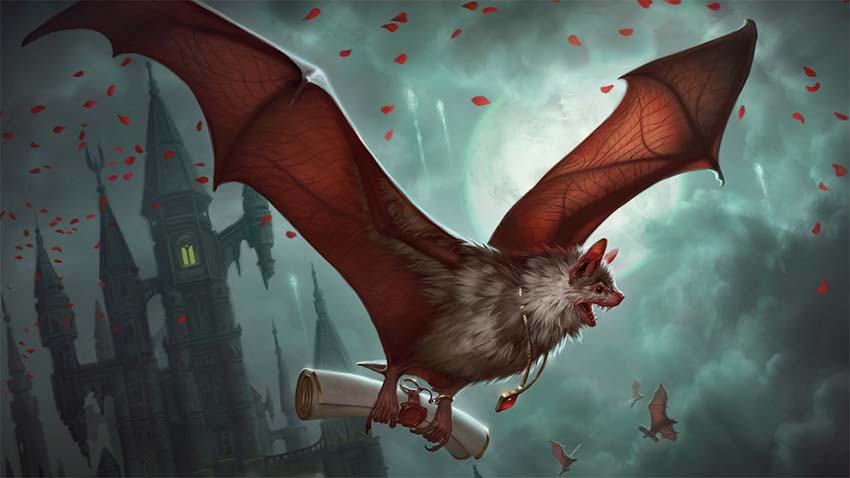
Adeline has known darkness in her life. She has known evil. Every breath she's taken since the tender age of twelve, when the Church first took her in, has been to strike down those who prey upon humanity.
It hasn't always been easy.
But it's been easier than this.
As she drives her sword through the vampire's heart, she feels only the smallest kind of triumph: at least he will not kill again. Shame soon follows the thought. The work she's doing here is vital—more vital than it's ever been—but it is hungry work, too. And it has eaten away at something within her.
Yet that isn't the face she can present to the others. They are expecting the indomitable hero, the knight on a white horse, the beacon of justice on a Plane that's long forgotten the meaning of the word. They're looking for a light.
But so is Adeline.
Light finds her no sooner than the vampire hits the ground and Chandra's fires swallow the body whole. In the orange glow, Adeline's eyes find her companion's.
Adeline can put on the brave face for everyone else—but only Chandra can see her now.
She lets her shoulders slump. She lets exhaustion reach her eyes. In the dark of the night, Chandra's flames are brighter than the moon.
The pyromancer doesn't ask if Adeline's okay. They both know that would be a pointless question. Instead, she squeezes Adeline's shoulder.
"You know, I found some wine in one of these old houses," she says. "Think we've earned a little treat."
Despite all that's happened, there's still a twinkle to Chandra's voice. Dimmer, these days, but it's there. Adeline lets it guide her for just a little while.
"It'll have to wait until after the meeting," she says, "but you're on."
The remains of the vampire smolder in front of them, the stench of cooking flesh crawling up their nostrils. Adeline sheathes her sword and heads upwind. All around them, their rag-tag group fights back. Some, like her, use weapons, battling the last of this old bloodsucker's ghouls and thralls. Some do it with compassion: the witch Deidama is among the many tending to the sick, the wounded, those who have seen too much and borne too much weight already. Magic cannot soothe all their ills.
But the right thing to do is to try.
This is the fifth counterattack they've launched this week. A little boy heard that there were those who fought against the endless night. When the vampires descended upon the village of Karo, he ran to them, his feet cracking open on the rocks in his path. Arlinn was the first person he found—and it's Arlinn who watches over him now, telling him a story as one of the witches tends to his wounds. The blood streaked and drying across her leathers makes a strange complement to the stew she's pouring into a bowl for the boy.
As Adeline and Chandra approach, Arlinn casts a glance their way. She gives the boy a nod and a heartening smile before breaking off to meet with them. Alongside her: Teferi, Kaya, Deidama, some of the other witches, deputized fiendslayers. Their group is not large, perhaps only two or three dozen to protect humanity, yet they are fierce siblings-in-arms. The rest—two hundred—remained in the woods. People needed a place to go when their homes were destroyed.
"How'd it go?" Arlinn asks.
"Fiends vanquished," Chandra answers.
Adeline nods, grateful she found such a bright way to put it. "The village will take time to rebuild, but they'll have safety. At least for tonight."
"Good work," says Arlinn. "We'll do what we can for them. Good thing about Kessigers—we can raise a house in a day. Give it a week or two and there'll be plenty of room for everyone."
There's much unsaid—that first the villagers will need to survive that long, that it's harder to build in the absolute darkness, that more will fall before anything can rise at all.
But it's tiring, too tiring, to think of that now. Arlinn's right: they'll do what they can. Other villages need them, too.
"You wanted to call a meeting?" she says.
Arlinn points to a makeshift campsite—the village's firepit, surrounded by flattened tree stumps and handwrought benches. One by one the valiant take their seats. Somehow, the smallest bench—suitable for two—remains empty for her and Chandra. Kaya's work, probably; she's the one smirking.
Well. Adeline won't argue. She sits, resting her sword against her knees. "So
All eyes align on Arlinn. The endless night's worn on her, too—that, and whatever drove her fight with Tovolar. Adeline sees more of the wolf than the woman, especially outside of meetings like this one. The sigh that leaves her this time is all too human.
"There's no song and dance about it," she says. "We can't keep this up."
"But what about Teferi's time magic?" Adeline asks. "Surely he could
Teferi presses his lips together. He looks up at the treacherous moon and back down. "Unfortunately, there isn't much I can do. Innistrad's solar system is a complicated one. The magic that's keeping the moon in place is ancient and tailored specifically for this Plane." His shoulders slump. "Even assuming I did figure out how to do it without ruining the Plane's ecosystems, it'd take more power than I currently have."
"This is bigger than any one person can solve," Kaya says. "Much as I'd prefer the alternative, we're going to need to stick together on this one."
"I don't understand," says Adeline. "We've grouped up already, haven't we?"
"We have. But our group, for the most part, is human," Arlinn explains. And she is right—apart from two or three of the remaining Wolfir, everyone is human. But why wouldn't they be? Adeline searches Arlinn's eyes for an explanation. It's quick to come. "The endless night doesn't just affect humans. If things continue the way they are, the vampires are going to run out of food eventually. Ten years, maybe, the whole Plane's picked clean. Once upon a time, there was someone among them who realized that. We need to pay him a visit."
Chandra's laugh is a nervous one. "Please say you're kidding."
"Chandra is right," says Adeline. "If you're talking about Sorin Markov, he showed us no kindness before. Why should that change now?"
Arlinn must have known this was coming—she doesn't let the question hang in the air very long. "Because everything's changed. Besides, it was Olivia Voldaren who stole the Moonsilver Key. If anyone will know something about her plans, it's him."
"And if the rumors I've heard are true, he hates her guts right about now," Kaya adds. Then, after a beat: "It's all anyone in Stensia can talk about. She's asking everyone there to donate a bowl full of blood."
"Which means she's up to something," Adeline agrees. "But why do we have to ask him?"
"We don't have any other way in," says Teferi. "Sorin's in a mood, but he's always been pragmatic. As our leading expert on egomaniacal planar guardians—"
"Give me a few years," Kaya cuts in.
"As someone who's known him for centuries, I think we can get through to him. This isn't the first time he's been in a mood, after all. In fact, come to think of it, I'm not sure if I've ever seen him any other way. But if nothing else, I'm sure he'll tell us what Olivia is planning."
"None of this ends unless we can get our hands on the key again. He's the only one who might give us a clue where it is," says Kaya.
It makes sense. Yet there's something Adeline can't forgive about him. "Arlinn, the last time we saw him, he was fighting Sigarda."
The muscles of Arlinn's jaw work. "I know. It
"But he isn't a sheep," Adeline says, "and you are a wolf."
A wry, knowing smile from the woman. "Means I know a thing or two about hunting, and a thing or two about packs. Adeline, I'd like if you came with us—but if you want to stay, I'll understand."
Adeline knows what's right; she knows how often the just thing is the heaviest thing. Cathars sometimes trained with weighted swords to drive the message home: the violent path should never be the first one taken; it should never feel easy to snuff out life.
If they can get through to him, maybe it's worth trying.
She feels Chandra's eyes on her, waiting for the answer. "I'll go. If there's a trace of Avacyn left in him, he'll listen."
Later, as they're gathering to leave, the boy from Karo finds her. He is waiting outside of her makeshift tent, his feet bandaged, in too-big armor he's scavenged. The Avacynian symbol on the front is nearly as long as he is. The pig he brought with him—a gigantic thing easily the size of a horse—sniffs at the ground nearby.
"How can I help?" he asks her.
Adeline kneels. "You've already helped plenty," she says. From the folds of her armor, she produces a symbol woven from sticks and unlit candles, which she drapes over his head. "The best thing you can do is get back home safe."
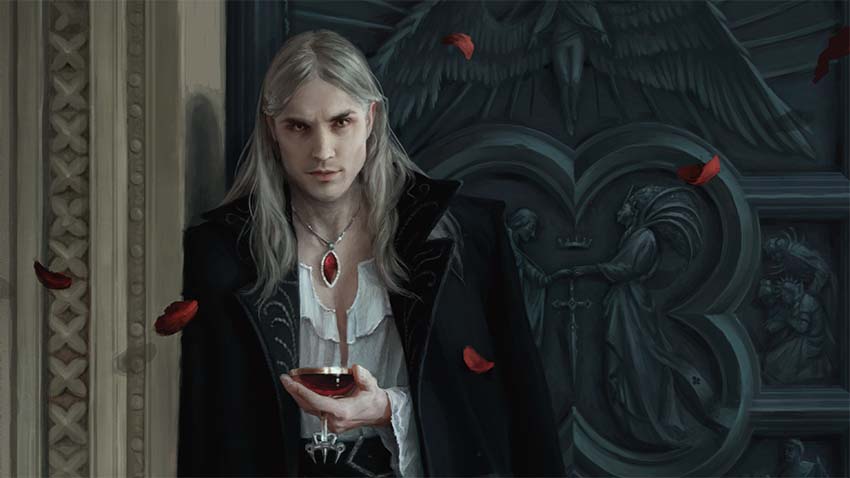
Innistrad will endure, so the saying goes. But one look out the window is all it takes to render that meaningless. There is no way Innistrad can endure this.
Sorin Markov is sure of it.
He's been sure of it for nameless centuries. Inclined as he was to philosophy, he sorted out the truth of the matter not long after his grandfather turned him. If no vampire ever died, and each vampire fed once a month, often killing their "donor," speaking conservatively, and humans took nine months to reproduce
Well, it just didn't make sense.
Even discounting humans who died of diseases, humans who became vampires, humans crunched between the jaws of wolves, and so forth—it didn't work. For Innistrad to endure (the saying existed even then), they would need to either severely limit the number of vampires created or ensure that humans lived.
Sorin, young then, approached his grandfather with his discovery. Edgar had long fostered the boy's interest in alchemy; surely, once he saw it all laid out in black and white, he'd realize the grave error he'd made.
Edgar listened intently to young Sorin's words. More than that, he asked insightful questions at every junction. In that two hours, Sorin learned more of the world than he had in preparing the presentation. His grandfather cast all his sources in a new light.
"Sorin. Do you truly believe I've never had the same thought?"
"But Grandfather," Sorin objected, "if you have, then why proceed in this way? The future is not intangible; as immortals, we will have to face it. Innistrad must endure—"
"Innistrad will endure. But only peasants feel the need to say so," his grandfather countered. "We have eternity to plan for it—or very near to it. The solution will present itself."
"Grandfather, this can't wait—"
"On the contrary. You're staring at only a small part of history's tapestry," said Edgar. Then, he picked up one of his quills and dipped it in ink. The scratch of it against parchment was a dismissal.
A small part.
He took his grandfather's advice. The solution would present itself. He had to think bigger, had to see beyond the immediate. The thought lingered in the back of his mind no matter where he went, growing more complex with every passing year.
It took six millennia for the larger picture to come together, but once it did, it felt obvious and right. He felt foolish for not seeing it sooner. Humans needed a protector. He gave them one.
Of course, by then, his fellow vampires had nearly drunk the Plane dry. It was a very close thing, saving Innistrad as he had.
Yet defeat found him, and defeat found her, and now even to breathe the air of this place fills him with bitterness.
Part of him wonders if his grandfather had planned for Avacyn and planned for her eventual fall. Edgar thought of everything, after all, and he knew his grandson better than anyone ever had and likely ever would. Had he planned for this eternal night? Had he known what it would do to the vampire population? To the human population?
All his years of life had not prepared Sorin for it.
At first, he'd taken the role of observer. Licked his wounds, holed up in the manor, and watched it all unfurl. The others knew as well as he did what would happen if they gorged themselves.
But if impatience is the last thing to die among vampires, then inhibition is the first. By Sorin's count, they have only months before all the humans on this Plane were vampires, werewolves, geists, or just plain dead.
His grandfather had been slumbering for long enough. If there was a plan for this eventuality, then it was time the two of them spoke.
Sorin descends the steps of Markov Manor. His short war with Nahiri, his failed protege, left much of the place in ruins, but the family archives remained largely intact, buried deep underground as they were. Twisted, floating knife blades gave way to graceful white arches and smooth stairs. Here, the geistflame burned bright; here, there was no dust on the steps nor motes in the air. Sorin himself enchanted this place. If all of Innistrad were to collapse in on itself today, his family archives would remain in testament to their own foolishness.
There were the books, of course, the first thing to greet him—carefully curated collections of all the Plane's wisdom. His grandfather's journals were given special treatment here, bound in golden covers and displayed beneath the purest glass. Three bookcases comprised Sorin's own journals—those he was not actively rereading or writing. The musings of generals, alchemists, even cathars and Avacynian priests winked back at him from their places on the shelves.
Save us, they seem to say.
How often people said those words to him. He grew weary of other people's problems, of saving other Planes, of the vast and complicated web he'd woven in his unending life. Innistrad—at least he knew Innistrad. He thought he could recover here. Once his house was in order, so to speak, he might emerge and deal with the other Planes once more.
Save us, they say to him.
I'm trying, he wants to say.
Past the books were portraits, statues, and the armory. He walks the narrow halls of white stone and does not stop to peruse the works of his brethren. Innistrad would endure. There would be time, later, if he wanted to lose himself in the memories of a House that never embraced him.
Only a little farther to the coffins.
When elders tired of the Plane around them, they often rested until it grew so alien that they could discover it anew. If he were a normal vampire—a simple immortal without the ability to leave Innistrad—he might have ended up here himself. But there must always be someone to watch over them, and, without fail, this person was always Sorin.
He resents them. He does not hide it, not here in the cold silence of the tomb. He glares at each name above each coffin, and he asks them in his mind why they could not be bothered to emerge. It was their decadence that led to all this, and yet here they were resting—perhaps even dreaming—while he cleaned up their mess.
Exhausting.
He has a coffin, too. A foolish thing. A promise he made to himself that he would rest.
The only thing keeping him from smashing it is the thought that his grandfather might see and might name it the childish fit of pique it is.
Onward. His grandfather rests in a mausoleum at the very end of the corridor, protected by a massive stone door. Often, Edgar woke for small spells. Sorin left him books for those cases—things he thought exemplified the current state of Innistrad. Sometimes, when he needed his grandfather's counsel, he would even wake him. The two would speak in the drawing room of the dead, and when it was done, Edgar would rest once more. It always left Sorin feeling like a child—but the advice had not once failed him.
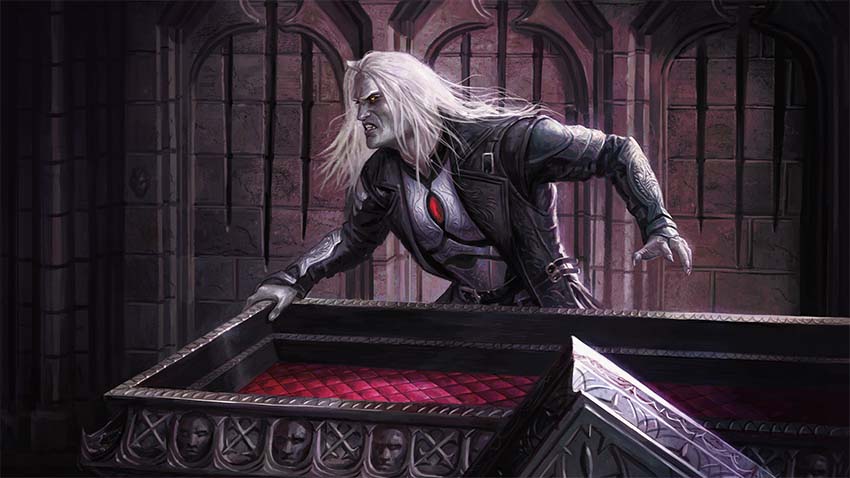
Resigned, he walks into the mausoleum expecting to see his grandfather resting in the mighty coffin Sorin commissioned for him or reading at his stately desk—and instead finds an empty room.
There are no statues here to greet him. Gone are the table, the chairs, even the empty teapot he kept here. Dust silhouettes the bookshelves where his grandfather's collection of knowledge used to dwell.
But none of this compares to the largest lack in the room: the coffin itself is missing.
Fury burns in his heart. It so often does, and yet now there is so little left to burn that all he can do is laugh.
Of course. Yesterday, he'd allowed himself to leave the grounds. He'd wanted to see what was going on with his own two eyes.
Of course, someone had struck while he was away.
He pinches his nose, considers his options. It is then that he hears the flapping of wings and feels the air shifting within the palace. Someone else is here. Perhaps more than one intruder.
He turns, snatching at the sound. A bat, by the feel of it. He crushes it without a second thought. Within its clutches—stained now by its blood—there is a single envelope.
To my Dearest, Most Precious Sorin Markov, Whom We Could Never Forget on This Day.
He knows that handwriting.
It takes centuries of patience not to crush the envelope, too. Instead, he opens it.
The words within do nothing for his mood. Oh, no. If his previous gloom was the darkness of a new moon, then this is the darkness of a moon snatched from the sky, never to return.
He throws the bat's limp body into a corner of the mausoleum and storms back up the stairs. There are other intruders; he can feel them. Still, if they have any part of this mockery
"Careful, that book's bound in human flesh."
The voice echoes down to him. A woman. Familiar, but only vaguely. They're in the library. When he comes upon them, they're standing in a half circle around his reading desk. Some of them he knows, but there are plenty of new additions. Seems they've picked up some strays along their travels: a thief of some kind, her eyes quicker and her smirk sharp; the pyromancer, hands in the air like she's seen something horrible. Then his eyes land on Teferi. Jovial as always, he's hiding a laugh. Teferi puzzled Sorin. He so rarely met others who could see the whole of history or anyone who smiled so easily. The wolf, Arlinn Kord, with her hands on her hips, lecturing. And the cathar that last came with them.
All in his library, in his family archives, behaving like children when confronted with one of the foremost texts on stitching in Innistrad. Of course it was bound in human vellum, what else did they expect? He didn't keep work by novices.
He has half a mind to puppet them all out of here, to grab them by their veins and set them walking. The other half—older, more patient, cognizant of his awful position—realizes that they must have come here for a reason.
"You have one minute to tell me why you're trespassing here," he growls.
Perhaps they did not hear him coming, for most snap to attention. Arlinn and Teferi are the lone exceptions. It is frustrating to him how easy Teferi remains, how none of this seems to trouble him. Worse yet, the wolf's eyes are on the letter.
"I think you know why we're here, Sorin," she says. "But the real question is: what's that?"
He could refuse to answer. But the truth—loath as he is to admit it—is that she's right. He knows why she's here. The eternal night bodes ill for the humans she cares so much about. Of course she would come to him again for help.
And, if honesty is the name of the hour
He throws the letter upon the table. The thief snatches it up first, the pyromancer leaning over her shoulder to read. Like a child, the latter cannot conceal her shock.
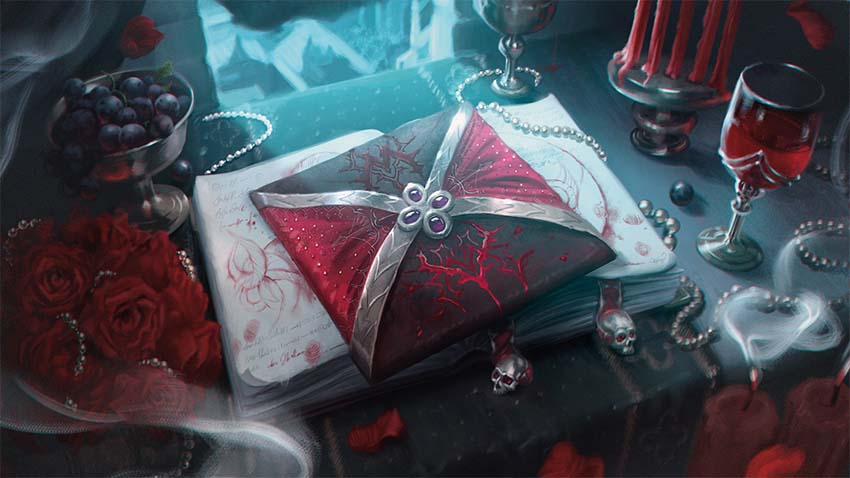
"It's an invitation," he says.
"An invitation?" Arlinn echoes. She, too, leans over to get a better look at the letter, but by now, the others are blocking her view with their rubbernecking.
"To a wedding. Oliva Voldaren's wedding." The name is poison on his tongue. "She's stolen my grandfather. If they marry, they'll form the largest of the vampire families. They'll—she'll rule all of Innistrad."
Arlinn snatches the letter away from the pyromancer. He watches as she reads it—watches her jaw work, watches as she realizes he isn't lying.
Then she fixes him with a look of surprising determination. "Looks like we've got a wedding to crash."

